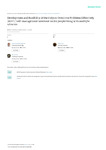Development and feasibility of the Help to Overcome Problems Effectively (HOPE) self-management intervention for people living with multiple sclerosis
| dc.contributor.author | Anderson, JK | |
| dc.contributor.author | Turner, A | |
| dc.contributor.author | Clyne, Wendy | |
| dc.date.accessioned | 2020-09-15T09:29:58Z | |
| dc.date.available | 2020-09-15T09:29:58Z | |
| dc.date.issued | 2017-05-22 | |
| dc.identifier.issn | 0963-8288 | |
| dc.identifier.issn | 1464-5165 | |
| dc.identifier.uri | http://hdl.handle.net/10026.1/16323 | |
| dc.description.abstract |
PURPOSE: To describe the development and feasibility of a self-management intervention called the Help to Overcome Problems Effectively (HOPE: MS), aimed at improving the physical and psychological wellbeing of people living with Multiple Sclerosis (MS). METHOD: HOPE: MS is an innovative, 6-week group-based, manualised self-management intervention combining positive psychology theory and practice, and cognitive behavioural therapy (CBT). Participants (N = 21) recruited via a local East Midlands branch of the MS Society attended one of three HOPE: MS interventions and completed self-reported outcome measures in week 1 and week 6. The following outcome measures were used: The Multiple Sclerosis Impact Scale; Multiple Sclerosis Fatigue Severity Scale; The Multiple Sclerosis Self-Efficacy Scale; The Adult State Hope Scale; The Hospital Anxiety and Depression Scale; The Positive and Negative Affect Scale. RESULTS: Post-intervention (6 weeks) mean scores decreased in the physical impact (baseline M = 65.6, SD = 17.4; 6 weeks M = 55.1, SD = 17.9, 95% CI [-4.39, -16.47] and the psychological impact of MS (baseline M = 24.0, SD = 7.3; 6 weeks M = 18.9; SD = 6.3, 95% CI [-2.54, -7.66]). There was also a decrease mean fatigue severity scores (baseline 49.4, SD = 13.3, 6 weeks M = 41.1, SD = 14.4, 95% CI [-2.65, -13.44]). There was a mean decrease in depression scores (baseline M = 6.9, SD = 3.5; 6 weeks M = 4.2, SD = 2.8, 95% CI [-1.43, -4.00]). There were smaller mean decreases in anxiety (baseline M = 7.6, SD = 3.4; 6 weeks M = 6.7 (4.0), 95% CI [0.69, -2.50]) and negative affect (baseline M = 22.9, SD = 6.8; 6 weeks M = 20.8 (8.1), 95% CI [0.69, -2.50]) refer Table 3 ). Mean MS self-efficacy scores (baseline 21.7, SD = 4.2; 6 weeks M = 24.1, SD = 4.7, 95% CI [0.23, 4.53]), mean total hope scores (baseline M = 23.3, SD = 10.7; 6 weeks M = 32.2 (10.6), 95% CI [4.91, 12.9]), hope agency scores (baseline M = 10.5, SD = 5.7; 6 weeks M = 15.7 (6.2), 95% CI [2.37, 8.01]), hope pathways (baseline M = 12.9, SD = 6.0; 6 weeks M = 16.6 (4.9), 95% CI [2.00, 5.43]) and positive affect scores increased (baseline M = 27.3, SD = 7.1; 6 months M = 32.2, SD = 8.4, 95% CI [0.42, 9.39]). Participants positively rated the intervention quality and delivery. CONCLUSIONS: This feasibility study showed that the HOPE: MS was acceptable and useful to people living with MS. Further robust evaluations using a randomised controlled trial design with longer follow ups are needed to confirm early promising results of the HOPE: MS. Implications for rehabilitation Living with MS requires constant adjustments to cope with unpredictable symptoms. Self-management interventions have the potential to help people living with MS to improve their quality of life. A feasibility study of the HOPE: MS self-management group-based intervention showed that it was acceptable and useful to people living with MS. | |
| dc.format.extent | 1114-1121 | |
| dc.format.medium | Print-Electronic | |
| dc.language | en | |
| dc.language.iso | eng | |
| dc.publisher | Informa UK Limited | |
| dc.subject | Hope | |
| dc.subject | multiple sclerosis | |
| dc.subject | quality of life | |
| dc.subject | self-management | |
| dc.title | Development and feasibility of the Help to Overcome Problems Effectively (HOPE) self-management intervention for people living with multiple sclerosis | |
| dc.type | journal-article | |
| dc.type | Journal Article | |
| plymouth.author-url | https://www.webofscience.com/api/gateway?GWVersion=2&SrcApp=PARTNER_APP&SrcAuth=LinksAMR&KeyUT=WOS:000398435200008&DestLinkType=FullRecord&DestApp=ALL_WOS&UsrCustomerID=11bb513d99f797142bcfeffcc58ea008 | |
| plymouth.issue | 11 | |
| plymouth.volume | 39 | |
| plymouth.publication-status | Published | |
| plymouth.journal | Disability and Rehabilitation | |
| dc.identifier.doi | 10.1080/09638288.2016.1181211 | |
| plymouth.organisational-group | /Plymouth | |
| plymouth.organisational-group | /Plymouth/Faculty of Health | |
| plymouth.organisational-group | /Plymouth/Faculty of Health/Peninsula Medical School | |
| plymouth.organisational-group | /Plymouth/REF 2021 Researchers by UoA | |
| plymouth.organisational-group | /Plymouth/REF 2021 Researchers by UoA/UoA03 Allied Health Professions, Dentistry, Nursing and Pharmacy | |
| plymouth.organisational-group | /Plymouth/Users by role | |
| plymouth.organisational-group | /Plymouth/Users by role/Academics | |
| dc.publisher.place | England | |
| dc.identifier.eissn | 1464-5165 | |
| dc.rights.embargoperiod | Not known | |
| rioxxterms.versionofrecord | 10.1080/09638288.2016.1181211 | |
| rioxxterms.licenseref.uri | http://www.rioxx.net/licenses/all-rights-reserved | |
| rioxxterms.type | Journal Article/Review |


